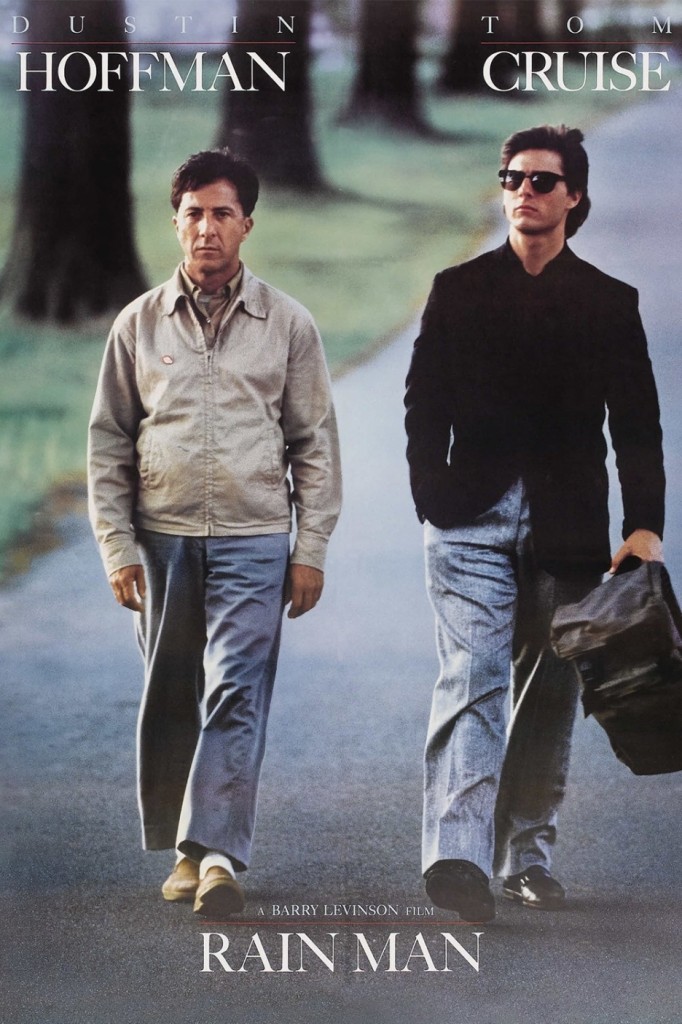On the surface, Rain Man seems like a reworking of a familiar–borderline banal–concept based of two genres, the male buddy film and the road picture.

It’s therefore the quality of the writing, direction (Barry Levinson), and acting, by both Dustin Hoffman and Tom Cruise, which elevate the movie above its potential trappings.
Our grade: B (*** out of *****)
The immense commercial success of the Oscar-winning drama, “Rain Man,” could also be attributed to its ideological message about mainstream family values. In this case, the rediscovery of love between two brothers: one, an autistic savant (Hoffman), the other, a young self-absorbed hustler (Tom Cruise), and a fast-talking car salesman.
At first, Charlie Babbitt wants to rob his older brother Raymond of the inheritance that their father has left, an estate worth $3 million, placed in a trust for Raymond. To that extent, Charlie kidnaps him from an institution, but Raymond is afraid of flying and so the siblings embark on a car journey from Cincinnati to Los Angeles .
Gradually, Charlie he gets to know his brother, of whose existence he has been completely ignorant, and both realize that they not only love but also need each other.
Though different in style (a comedy) and genre (a road movie), “Rain Man” endorses similar values as Fatal Attraction, which was also in the run for Best Picture: a desire to uphold stability and the unity of the nuclear family.
Though effective, Hoffman’s performance is a stunt, based on some workable gimmicks that accentuate his narcissism as an actor. It is Cruise who surprises in the manner that he measures up to Hoffman, providing the narrative center and support without which the movie would not have worked. Needless to say, Cruise plays a far more interesting and complex part than Hoffman.
The movie is very much a two-handler melodrama, and the sight of Valeria Golino, as Charlie’s girlfriend, just adds some color and spark to the proceedings.
Production values are lavish, especially John Seale’s Oscar nominated cinematography.
Countless of directors, including Mike Nichols, have tried to make this movie before Levinson, who benefits from the workable scenario by Ronald Bass and Barry Morrow, based on the latter’s story.
“Rain Man” also serves as a testament to the new kind of films made in the New Hollywood. Packaged by a powerful agency, CAA (then at its prime) and dominated by stars (Dustin Hoffman, left, and Tom Cruise, right), its message was in tune with the neo-conservative times: the importance of brotherly love and the nuclear family.
Hoffman’s first Best Actor Oscar, for “Kramer Vs Kramer “ (1979), and his second Oscar, for “Rain Man,” have nothing in common but high-caliber acting, though some critics found his 1988 turn to be gimmicky—no more than a stunt. However, thematically, both films celebrate the sanctity of the America family.
Blending conventions of the comedy-drama with those of the road film, “Rain Man” propagated mainstream family values of the 1980s: the predominance of kinship instincts and blood ties against all odds, and the importance of protecting the unity of the nuclear family.
Oscar Context
The large public embraced the film even before it was nominated for eight awards, winning four major ones: Best Picture, actor (Hoffman), director (Barry Levinson), and original screenplay (Ronald Bass and Barry Morrow, based on a story by Morrow).
Cast
Raymond Babbitt (Dustin Hoffman)
Charlie Babbitt (Tom Cruise)
Susanna (Valeria Golino)
Dr. Bruner (Jerry Molen)
John Mooney (Jack Murdock)
Vern (Michael Roberts)
Lenny (Ralph Seymour)
Iris (Lucinda Jenny)
Sally Dibbs (Bonnie Hunt)
Credits
Running time: 128 Minutes
![]()
![]()
![]()
![]()
![]()










